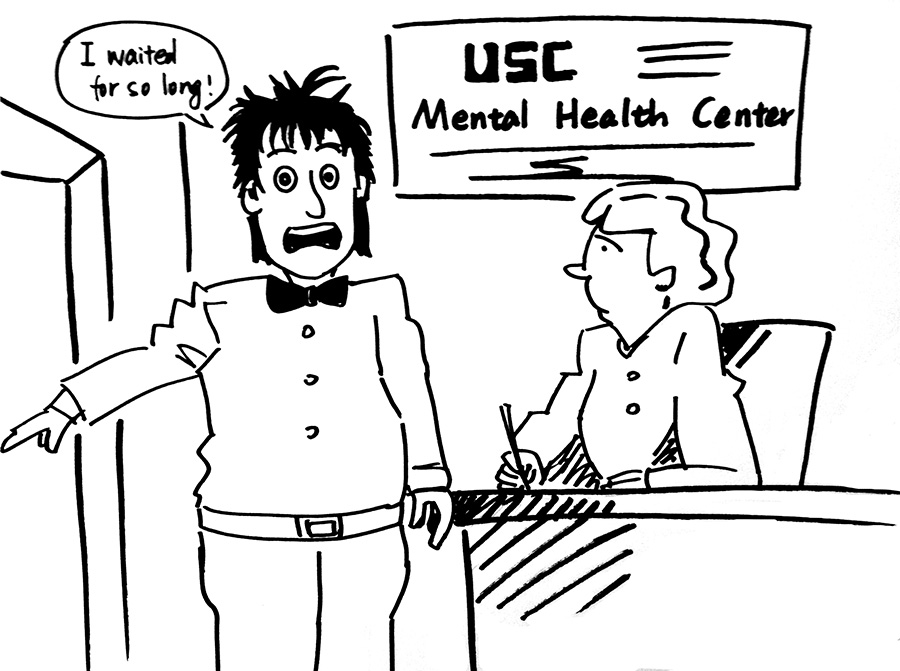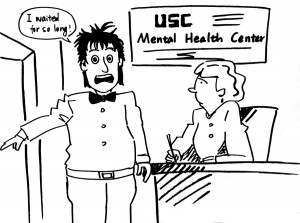Mental health care at USC needs reform
Between the million dollars in funding from donors and alumni and the high tuition rates, health services on campus are expected to be impressive. Reality, however, doesn’t reflect the standards. The care for mental health offered by counseling services in the Engemann Student Health Center is inadequate and ill-equipped to take care of students suffering from mental illness.
This past week, the Health Sciences Education program hosted a poetry slam event, Slamming Down the Stigma, to raise awareness of the mental health issues on campus and to spread the idea that mental illness is not something to “be ashamed of.” At this event, students who have personally dealt with mental health issues or have loved ones that suffer from some form of mental illness were able to share their emotions and experiences through the art of poetry. Students brought up USC’s failure to serve those who need ongoing treatment for serious issues.
Though the current system is great for those who need to discuss problems they’re going through, a brief meet-up isn’t sufficient for those who desperately need help. USC does offer individual and group counseling, crisis and psychiatric services and outreach programs, but options for those who need long-term, care-intensive treatment on site are limited. For students who can’t drive themselves around the city to attend appointments off-campus, this lack of long-term treatment options is a real issue.
The need for mental health care in colleges complicates this problem. According to a survey by the American College Counseling Association, most students seek advice for post-adolescent trouble such as breakups and identity crises. What was alarming, though, was that 44 percent in counseling suffered from severe psychological disorders, an increase from 16 percent in 2000. Disorders include depression, anxiety, suicidal thoughts, alcohol abuse, attention disorders, self-injury and eating disorders.
Beyond the inadequacy of mental healthcare, the way in which Residential Education handles students that need mental health care has also been a disappointment.
Ariana Aboulafia, a junior majoring in political science and law, history and culture, believes resident assistants play a big role in the process. “I will say right off the bat that it’s a difficult position for both people involved. We enter college thinking an RA is someone we can trust, someone we can talk to as long as we’re not ‘harming ourselves or others,’” Aboulafia said.
Lauren Falahee, a former RA who graduated last year with a bachelor’s degree in biomedical engineering, stressed the nuanced role of RAs. “I really feel that there is a huge difference between the RA that residential education wants you to be, versus the RA that your residents need you to be,” Falahee said. “An RA should be a peer, not a superior, who is there to be a resource and guide for first-year students transitioning into USC. They should be someone you can confide in, because at the end of the day, they are just students.”
One student at the poetry slam, who wished to remain anonymous, discussed his own experience. He stood up and explained that when he opened up to his RA, he was reported to the supervisor, and DPS threatened to escort him to the counseling services if he did not go on his own. Yet, in reality, because of the failures of the mental health center, if he did end up needing long-term treatment, he would never be able to receive it at USC. The idea that a school that requires students to attend counseling sessions if they mention feelings of depression cannot actually give students real help or medication if necessary, is detestable.
Residential Education needs to be more aware of the delicate nature of students opening up about their mental health concerns and only force counseling upon those that admit to desiring self-harm or hurting others. Otherwise, students are shamed into therapy and will begin trying to avoid it because they felt pressured. The Health Center needs to improve itself by hiring permanent psychiatrists and therapists that could provide ongoing treatment and medication.
Though college students are legal adults entitled to privacy and autonomy, schools still hold some responsibility in overseeing their safety and well-being. Here at USC, it all comes down to whether or not the administrators care enough to give us a mental health center that ensure students’ mental stability.
Chelsea Hernandez is a senior majoring in English (creative writing). Her column, “Foot in Mouth,” runs Wednesdays.



Slamming Down the Stigma
You dare teach a “stigma””?!” How thoroughly
offensive.
Harold A. Maio, retired mental health editor